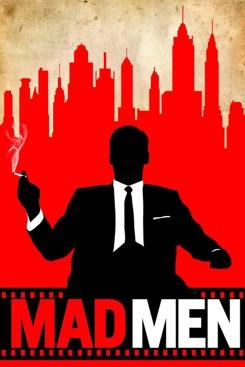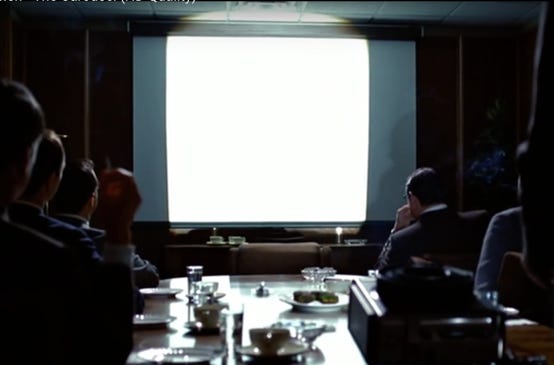Don Draper sells Eastman Kodak the Carousel (Mad Men S1.E13 “The Wheel”)
Dispatch 002
In a piece of outstanding television from the Netflix hit series Mad Men, Kodak comes to Sterling Cooper with a new product that they want worked into a campaign. They think of it as a “donut” or “wheel,” and they’re looking for a way to sell it as a new technology. One of their reps concedes, “We know it’s hard because wheels aren’t really seen as exciting technology, even though they are the original.”
Don finds himself at home rummaging through a private shoebox of his own memorabilia. (He is already notoriously private by this point in Season 1). In the pitch, Don acknowledges that “technology is a glittering lure.” Then he sets it aside, with the help of an old Greek mentor, in favour of “a sentimental bond … a deeper bond with the product: nostalgia.” This bond, he says, is “delicate, but potent.” Don replaces technology, emblematic of rational, scientific achievement, with desire.
He takes his boardroom audience on a tour of happy memories, from images of the carefree innocence of children to good-dad moments, from the loving bond between him and his wife as a young couple to the white purity of their wedding day. During this time, Don leads them with a voiceover that underscores emotion. His mentor, he says, taught him the original meaning in Greek of the word nostalgia: “the pain from an old wound.” Don calls it “a twinge in your heart far more powerful than memory alone.” Memory alone is an assemblage of facts; nostalgia involves your heart, and pain.
When we engage with memories by looking at a slideshow, he says, we escape the world of technology: “This device isn’t a spaceship, it’s a time machine.” In another context, both halves of the declaration might refer to technologies, but here, time travel is the work of the imagination and of the emotions. The device “takes us to a place where we ache to go again.” He then relabels the product: “It’s not called the wheel, it’s called the carousel.” The line hits like a punch because the wheel represents technological rationality, the carousel a yearning, and the latter overwhelms the former. The show has condensed the cultural artefact of love-and-reason-in-tension to two objects, a wheel and a carousel.
At this point, Don still hasn’t pitched the campaign directly. Instead, he meditates on childhood, home, and love. The device “lets us travel the way a child travels, round and round, back home again … to a place where we know we were loved.” A child doesn’t have an agenda or a linear, rational intention; a child meanders, seemingly without purpose, led not by logic but by their whims and imagination.
Only then does Don present a single slide advertising the product, a carousel slide projector accompanied by images symbolic of the carnival ride and lettering from an earlier time. He then returns to the evocation of strong emotion with a final slide showing him and his wife affectionately kissing.
“Home” is the word Don calls upon to represent a time and place of imagined wholeness. Technology is seductive. Children like the glittering new toy (in one slide, a shiny red Radio Flyer wagon carries Don’s toddler son), the adventure in the park, the trip to see the sights and be awed. As adults, we invest more and more in it to keep us going with a sense of the new, of possibility, of achievement. At the same time, though, nostalgia takes us back to a simpler time when, so we think, we had what we wanted and the world made sense. The word “home” (“back home again … where we know we were loved”) stands for the reconciliation of the tensions of adult life. Things made sense and we were emotionally alive in a way that was ultimately positive. This is the world projected upon prospective Kodak carousel owners. The old wound will be salved.
Don’s own case seems to be one of home as fantasy. As far as anyone is ever allowed to see, it never existed as wholeness for him. The average viewer’s experience may not be as tortured as Don’s, but he stands for Everyman as potently as he does for an anti-hero. The show conveys the notion of trying to recover or recreate home as an ongoing project. This project finds reference points in families in various states of formation and deformation.
In “The Wheel,” the themes and energies of Mad Men find expression in the tension between love and reason figured as nostalgia and negotiating technological modernity.
Norm Klassen (dphil oxon) is Professor of English at St Jerome’s University in Waterloo, Canada, with a background in theology (B.Th.), history (B.A. Hons), and literature (B.A. Hons). He has taught literature for over thirty years and is the author of two books on Chaucer, one on literary theory, and co-author of another on higher education. The two paradoxes that seem to have preoccupied him in his work in the vineyard have been the relationship between Christianity and culture and that between love and reason.




